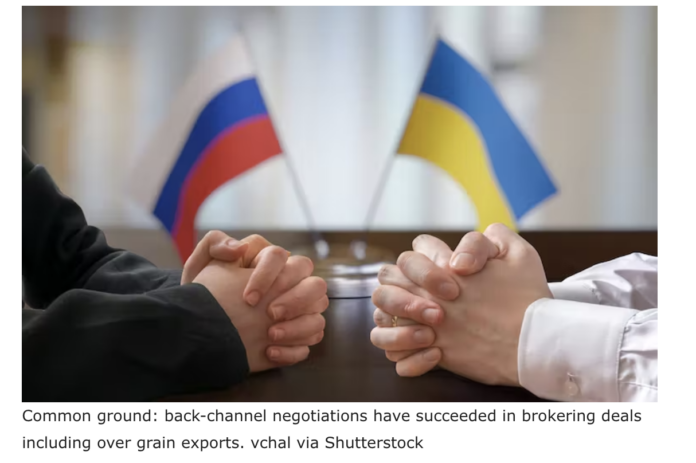Ukraine war: Moscow and Kyiv are talking – just not about peace
By David Lewis, University of Exeter
At the G20 summit in Bali in November, Ukrainian president Volodymyr Zelensky announced a new ten-point plan to end hostilities. He demands nothing less than the withdrawal of Russian troops from all of Ukraine, including Crimea and other areas of the country occupied by the Russians since 2014. And the latest polls show 85% of Ukrainians support his uncompromising stand.
But Russia’s position is as unyielding. Vladimir Putin is adamant that any political settlement will be based on “the realities that are taking shape on the ground”. Moscow wants to force Ukraine to recognise Russia’s occupation of nearly 20% of its territory.
Far from any peace talks, Ukrainian generals are worried about a new Russian offensive. But this doesn’t mean the two sides are not talking.
There have been back-channel talks on a whole range of issues, brokered by mediators from Turkey, the UAE and Saudi Arabia. Oligarchs such as Roman Abramovich have been playing an unofficial role. Abu Dhabi and Ankara are the Helsinki and Vienna of this new cold war – cities where Russian, Ukrainian and western diplomats, businesspeople and spies can easily meet away from media scrutiny.
Nuclear security
The toughest negotiation has been over nuclear security. Rafael Grossi, director general of the International Atomic Energy Agency, has been mediating talks to establish a “protection zone” around the Zaporizhzhia nuclear power plant. Russia occupied the plant early in the war and has attempted to annexe the whole region after a sham referendum in September. Ukraine rejects these claims – as does most of the Ukrainian workforce at the plant.
But they are now on the frontline of the war. In November, Grossi called an outbreak of shelling around the plant “madness”. Russia claims that Ukraine has been firing recklessly on the plant and mounting raids to try to recapture it. Ukraine claims that Russia uses the plant as cover to fire on Ukrainian forces.
In early December, there were rumours of a potential deal – but the two sides differ on what a “protective zone” means. Ukraine wants a full withdrawal of Russian forces and personnel. The G7 backed this position in a statement in October. But Russia fears that any further retreat will provoke nationalist ire at home and give Ukraine a platform for a new counteroffensive.
In early December, Grossi told the press that he hoped to negotiate a deal by the end of the year, but since then there has been little sign of progress.
Fertiliser deals
A second backroom discussion has been held on the fertiliser trade, a critical problem for global food security. Russia is a major exporter of ammonia, the key ingredient in fertiliser. Prior to the war, the bulk of Russia’s exports travelled along an ageing Soviet-era pipeline from Tolyatti in central Russia to the Ukrainian port of Odesa.
The pipeline was closed in February 2022 when the war broke out. But under a deal negotiated in July by Turkey and the UN, Russia agreed to allow exports of grain to resume from Ukrainian ports. As part of the deal, Russian ammonia exports were also to restart – but Ukraine refused to allow the pipeline to reopen.
The UN has held several meetings with both sides, and persuaded Russian and Ukrainian delegations to meet on November 17 in Abu Dhabi.
The deal on the table is complicated. It would involve a US company buying ammonia from the Russians at the Russian-Ukrainian border before reselling it on international markets. The stumbling block seems to be Ukraine’s demand for a major prisoner swap as the price to get the pipeline running again.
The EU did relax some sanctions against Russian fertiliser producers on December 15 to allow shipments to leave European ports. The move sparked protests from Ukraine, Poland and Lithuania, and shows the difficult balance between a tight sanctions regime and global food security. But the Russian-Ukraine ammonia pipeline remains blocked.
Prisoner swaps
Talks on prisoner exchanges have been more successful. Turkey and Saudi Arabia were both involved in negotiating a major exchange of 300 POWs in September. Despite the political rhetoric on both sides, ideology is largely absent from the prisoner swaps.
Instead, there is ruthless bargaining. In the September deal, 215 Ukrainian soldiers returned home compared with just 55 Russians. But the Ukrainians had an ace card: Putin’s Ukrainian crony Viktor Medvedchuk, who was facing treason charges after being captured early in the war. And there were some smart compromises: commanders from Ukraine’s Azov regiment were released on condition that they sit out the war in Turkey.
Since then, there have been regular swaps. By December 7, Ukraine reported that 817 Ukrainian prisoners had been released since September. A further 65 Ukrainians and a US citizen returned home on December 15.
Some see this as hope for wider talks. The head of the International Committee of the Red Cross, Mirjana Spoljaric Egger, has pointed out that such exchanges sometimes lead to wider agreements. But there are more prosaic reasons driving the exchanges too. Prisoner swaps save money for both sides, and give them leverage for talks on other issues.
None of these backroom deals suggest that peace talks will come any time soon. While Putin continues to seek the destruction of the Ukrainian state, there is little prospect of a genuine peace deal. But they do show that both sides have informal channels for negotiations. These might be the best hope for now to avoid dangerous escalation, and to mitigate some of the worst impacts of the war on ordinary people.![]()
David Lewis, Professor, International Politics, University of Exeter
This article is republished from The Conversation under a Creative Commons license. Read the original article.



